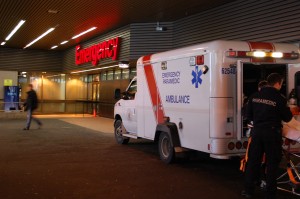 Trauma—a potentially serious and life-threatening physical injury that may result in shock, respiratory failure, and death—is the leading cause of death in the first four decades of life. Costing British Columbians an estimated $5 billion per year, it is the third largest cost contributor to the BC health care system. Improving trauma services is clearly an important part of improving health care for BC.
Trauma—a potentially serious and life-threatening physical injury that may result in shock, respiratory failure, and death—is the leading cause of death in the first four decades of life. Costing British Columbians an estimated $5 billion per year, it is the third largest cost contributor to the BC health care system. Improving trauma services is clearly an important part of improving health care for BC.
Falling under PHSA’s newest division, BC Emergency Health Services, Trauma Services BC (TSBC) is dedicated to ensuring all British Columbians have access to a high-performing, comprehensive, integrated, and inclusive provincial trauma system. TSBC works with health authority trauma leaders through the TSBC Council and its working groups to improve trauma care through better integration across British Columbia.
The TSBC Council is made up of trauma leaders and representatives from health authorities, BC Children’s Hospital, BC Ambulance Service, BC Bedline (Patient Transport Network), and the BC Trauma Registry. When certain expertise is needed, the Council can include members from rural trauma centres, rehabilitation, emergency management, public health, the coroner’s office, police, fire, the BC Medical Mobile Unit, and even patients.
Some of the work being done by the TSBC Council and working groups include:
- assisting with regional trauma program development in each of the health authorities;
- developing policy, practice standards, and clinical practice guidelines;
- developing, monitoring, and reporting on performance improvement measures;
- collecting and reporting on data (demographics, trauma incidents, quality indicators) with the BC Trauma Registry;
- seeking out data models for benchmarking; and
- developing a quality review and performance improvement process for cases that cross programs and/or health authority.
Formed in early 2012, the team’s momentum has already led to successes:
Burn Care
Vancouver General Hospital, Victoria’s Royal Jubilee Hospital, and BC Children’s Hospital house the province’s three major burn centres. TSBC is working with burn care leaders from these centres and other provincial-wide burn care stakeholders to collaborate on a standardized approach to burn care. A Provincial Burns Working Group under the TSBC Council has been established to review processes, transfer and transport criteria, and patient care protocols. An example of this work is the adoption of a clinical practice guideline for assessment and resuscitation of adult major burn patients.
Trauma Destination Protocols
Trauma patients have better outcomes when they are taken to a facility that provides the appropriate level of care, rather than being taken to the closest hospital. A trauma destination protocol is an algorithm (step-by-step procedure) showing once a trauma patient has been identified, which designated trauma facility the patient should be taken to and by what mode of transport. After reviewing an inventory of all trauma destination protocols from around the province as well as geography, field triage, and current literature/research, TSBC is aligning all destination protocols to ensure consistency across BC.
On the Horizon
TSBC is looking at building an inclusive trauma care model with all designated sites knowing their role and responsibilities within the provincial system. The system will also take advantage of telehealth infrastructure to help support our rural sites with acute care and post-repatriation care. Close alignment with BCEHS’s new Patient Transfer Network is a foundation for this work going forward. Another project involves the BC Trauma Registry (BCTR), a robust tool to help inform policy and quality guidelines. TSBC and the BCTR will be looking at how to incorporate data from other trauma-related populations that are not currently captured by the registry. These would include those seen by the coroner (people who died at the scene and are thus not taken to hospital) and ambulatory patients who are not admitted to hospital.
It’s going to be a busy year for Trauma Services BC!
